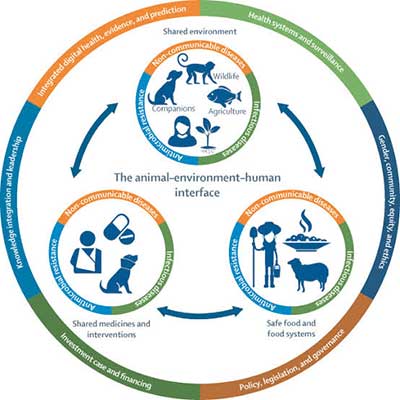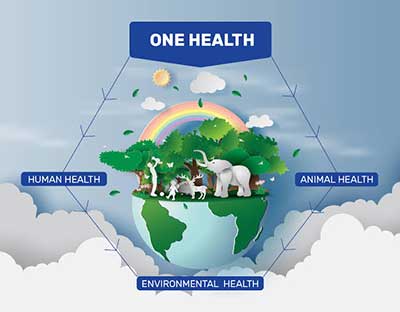One Health High-Level Expert Council in news
International organizations are taking steps to strengthen multilateral health architecture. Four entities, including the United Nations Environment Programme (UNEP), as well as a number of key international experts, have agreed to set up a One Health High-Level Expert Council to collect, distribute and publicize reliable scientific information on the links between human, animal and environmental health. The aim is to assist public officials in making appropriate decisions to avoid future crises and to inform citizens.
Organizations ready to promote one health approach :
The heads of the World Health Organization (WHO), the World Organisation for Animal Health (OIE), the Food and Agriculture Organization of the United Nations (FAO), and UNEP have agreed to strengthen collaboration to address risks at the human-animal-environment interface.
The “One Health” approach, supported by UNEP, is a cross-cutting and systemic approach to health based on the fact that human health and animal health are interdependent and linked to the health of the ecosystems in which they co-exist. UNEP is excited to deepen our collaboration and strengthen the environment dimensions of a One Health approach with Tripartite Alliance members WHO, FAO and OIE.

WHO works closely with the Food and Agriculture Organization of the United Nations (FAO) and the World Organisation for Animal Health (OIE) to promote multi-sectoral responses to food safety hazards, risks from zoonoses, and other public health threats at the human-animal-ecosystem interface and provide guidance on how to reduce these risks.
What is 'One Health'?
'One Health' is an approach to designing and implementing programmes, policies, legislation and research in which multiple sectors communicate and work together to achieve better public health outcomes.
The areas of work in which a One Health approach is particularly relevant include food safety, the control of zoonoses (diseases that can spread between animals and humans, such as flu, rabies and Rift Valley Fever), and combatting antibiotic resistance (when bacteria change after being exposed to antibiotics and become more difficult to treat).

Why do we need a One Health approach?
Many of the same microbes infect animals and humans, as they share the eco-systems they live in. Efforts by just one sector cannot prevent or eliminate the problem. For instance, rabies in humans is effectively prevented only by targeting the animal source of the virus (for example, by vaccinating dogs).
Information on influenza viruses circulating in animals is crucial to the selection of viruses for human vaccines for potential influenza pandemics. Drug-resistant microbes can be transmitted between animals and humans through direct contact between animals and humans or through contaminated food, so to effectively contain it, a well-coordinated approach in humans and in animals is required.








